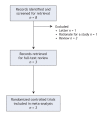Fish-oil supplementation in patients with implantable cardioverter defibrillators: a meta-analysis
- PMID: 18195289
- PMCID: PMC2174988
- DOI: 10.1503/cmaj.070261
Fish-oil supplementation in patients with implantable cardioverter defibrillators: a meta-analysis
Abstract
Background: A recent Cochrane meta-analysis did not confirm the benefits of fish and fish oil in the secondary prevention of cardiac death and myocardial infarction. We performed a meta-analysis of randomized controlled trials that examined the effect of fish-oil supplementation on ventricular fibrillation and ventricular tachycardia to determine the overall effect and to assess whether heterogeneity exists between trials.
Methods: We searched electronic databases (MEDLINE, EMBASE, The Cochrane Central Register of Controlled Trials, CINAHL) from inception to May 2007. We included randomized controlled trials of fish-oil supplementation on ventricular fibrillation or ventricular tachycardia in patients with implantable cardioverter defibrillators. The primary outcome was implantable cardioverter defibrillator discharge. We calculated relative risk [RR] for outcomes at 1-year follow-up for each study. We used the DerSimonian and Laird random-effects methods when there was significant heterogeneity between trials and the Mantel-Hanzel fixed-effects method when heterogeneity was negligible.
Results: We identified 3 trials of 1-2 years' duration. These trials included a total of 573 patients who received fish oil and 575 patients who received a control. Meta-analysis of data collected at 1 year showed no overall effect of fish oil on the relative risk of implantable cardioverter defibrillator discharge. There was significant heterogeneity between trials. The second largest study showed a significant benefit of fish oil (relative risk [RR] 0.74, 95% confidence interval [CI] 0.56-0.98). The smallest showed an adverse tendency at 1 year (RR 1.23, 95% CI 0.92-1.65) and significantly worse outcome at 2 years among patients with ventricular tachycardia at study entry (log rank p = 0.007).
Conclusion: These data indicate that there is heterogeneity in the response of patients to fish-oil supplementation. Caution should be used when prescribing fish-oil supplementation for patients with ventricular tachycardia.
Figures




Comment in
-
Should patients with cardiovascular disease take fish oil?CMAJ. 2008 Jan 15;178(2):181-2. doi: 10.1503/cmaj.071654. CMAJ. 2008. PMID: 18195293 Free PMC article. Review. No abstract available.
References
-
- CBC News. Contaminated fish? Benefits outweigh the risks. Toronto: Canadian Broadcasting Corporation; 2007. Available: www.cbc.ca/news/background/foodsafety/fish.html (accessed 2007 Aug 15).
-
- BBC.co.uk. Guidance on oily fish consumption. London (UK): BBC; 2004. Available: http://news.bbc.co.uk/1/hi/health/3834955.stm (accessed 2007 Aug 15).
-
- Barton A. How flawed is your fish? Globe and Mail [Toronto] 2007. Available: www.theglobeandmail.com/servlet/story/RTGAM.20070516.wxlfish16/BNStory/G... (accessed 2007 Nov 20).
-
- Mozaffarian D, Rimm EB. Fish intake, contaminants and human health: evaluating the risks and the benefits. JAMA 2006;296:1885-99. - PubMed
Publication types
MeSH terms
Substances
LinkOut - more resources
Full Text Sources
Medical
